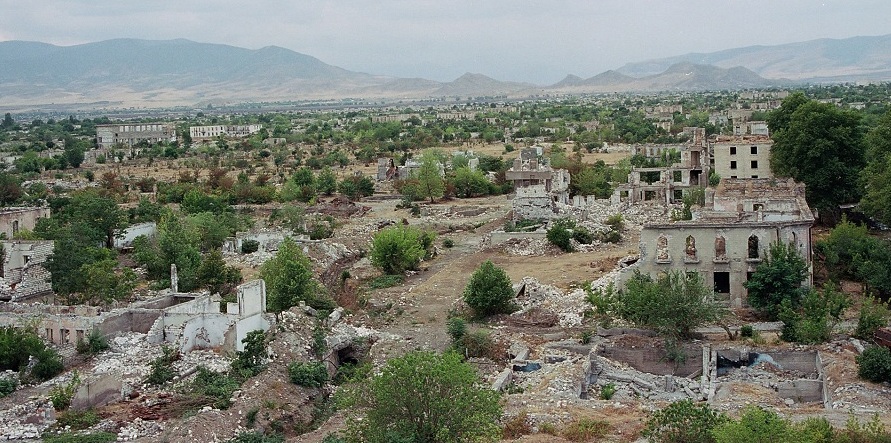Dead point: OSCE Minsk Group doomed to fail

By Nazrin Gadimova
Over the entire period of its existence, the OSCE Minsk Group failed to move forward in resolving the Nagorno-Karabakh conflict, although the interested parties had pinned great hopes on it. However, within over two decades past the hope for bringing the conflict to the final solution in fact disappeared as the group did take no efficient step or action to fulfill its mandate.
Nagorno-Karabakh conflict evolved in 1988 after Armenia territorial claims to neighboring Azerbaijan, whose 20 percent of lands it occupied in an unneighborly way.
The OSCE Minsk Group acted as the only mediator in resolution of the conflict, proceeding talks based on the renewed Madrid principles. The statements promising a sincere contribution to the peaceful resolution of the conflict have become frequent, but declarative in essence. That, unfortunately, ruined confidence in success of the mediators representing the U.S., Russia and France.
The group's activities were subjected to criticism many times and FM Elmar Mammadyarov has numerously stated his government's dissatisfaction with the work for pushing the conflict from the dead point.
The minister, in particular, said that the co-chairs of the Minsk Group have failed to make any progress in resolving the conflict over the years. He added that despite the fact that three permanent members of the UN Security Council lead the OSCE Minsk Group, there is no breakthrough in this long lasting confrontation.
Protecting mandate
On the eve of the discussion on Nagorno-Karabakh in the PACE, the co-chairs of the OSCE Minsk Group issued a joint statement, which recalled that ‘the Minsk Group remains the only acceptable format for negotiations’.
The co-chairs noted that they appreciate PACE members’ interest in the conflict resolution, but at the same time urged to avoid steps which could undermine the mandate of the Minsk Group.
“We are not against discussions on Nagorno-Karabakh conflict at regional and international organizations,” OSCE Minsk Group co-chair from the U.S. the James Warlick said in his interview to the ‘Voice of America’, answering the question ‘Azerbaijani government sharply criticized the OSCE Minsk Group co-chairs calls on the resolution regarding Nagorno-Karabakh to the European Council to Parliamentary Assembly. What was the necessity for such a call?’
Warlick noted that the organization supports the rights of Azerbaijan and Armenia to raise this issue as they want, adding that the co-chairs emphasize that format of the negotiations, which was adopted by the Minsk Group, remains in force.
“We believe that being loyal to their obligations, Armenia and Azerbaijan will closely cooperate with the Minsk Group to resolve the conflict by negotiations,” he said.
Meanwhile, Azerbaijan’s Foreign Ministry sent letters to its counterparts from Russia, France and the United States, which emphasized that the country has the right to raise any issue on the global agenda.
“Nobody has the right to interfere in the sovereign affairs of our country," Mammadyarov said.
Schiff, Nuland vs PACE
On January 26, 2016, the Parliamentary Assembly of the Council of Europe put two reports on the Nagorno-Karabakh conflict to the vote.
The PACE adopted a resolution titled “The inhabitants of the border regions of Azerbaijan are deliberately denied access to water” dealt with the situation around the Sarsang reservoir.
Prepared by parliamentarian from Bosnia and Herzegovina Milica Markovic, the document noted that the residents of Azerbaijan’s border regions were faced with environmental and humanitarian problem given the problem with Sarsang reservoir, located in Nagorno-Karabakh.
With the majority of votes (66 pro and 71 con) the PA rejected a resolution of the British MP Robert Walter titled “The escalation of violence in Nagorno-Karabakh and other occupied territories of Azerbaijan”.
The report called for the withdrawal of Armenian armed forces and other irregular forces from Nagorno Karabakh and other occupied territories of Azerbaijan.
Moreover, the document called on both governments to refrain from using military force, called on the OSCE to establish an international peacekeeping force to maintain security in Nagorno-Karabakh, as well as to ensure safe return of those displaced from their residences. The document also envisaged creating a mechanism to investigate violations of the ceasefire.
Norwegian MP Mogens Jensen, who presented the report, recalled that Armenia did not allow him to the country and Nagorno Karabakh.
Later, in an interview with the Armenian Asbarez newspaper, U.S. Congressman Adam Schiff said U.S. Assistant Secretary for European and Eurasian Affairs Victoria Nuland has played a special role in declining the resolution on the Nagorno Karabakh conflict.
“I appealed to the U.S. State Department and one of the regional ambassadors before discussion on the resolution had started,” Schiff said. “I expressed my position and noted that this is one-sided resolution which supports Azerbaijan. Both the ambassador and Victoria Nuland said they would work on it.”
On February 10, 2016, Azerbaijan’s Foreign Ministry sent a request to the Azerbaijani Embassy in Washington requesting to clarify the possible involvement of the U.S. State Department in the process of discussing the resolution in the PACE.
Commenting on this issue, the U.S. State Department said the United States respects Azerbaijan’s sovereign right to raise issues relating to Nagorno-Karabakh in any regional and international organization, including the PACE.
--
Nazrin Gadimova is AzerNews’ staff journalist, follow her on Twitter: @NazrinGadimova
Follow us on Twitter @AzerNewsAz
Here we are to serve you with news right now. It does not cost much, but worth your attention.
Choose to support open, independent, quality journalism and subscribe on a monthly basis.
By subscribing to our online newspaper, you can have full digital access to all news, analysis, and much more.
You can also follow AzerNEWS on Twitter @AzerNewsAz or Facebook @AzerNewsNewspaper
Thank you!
